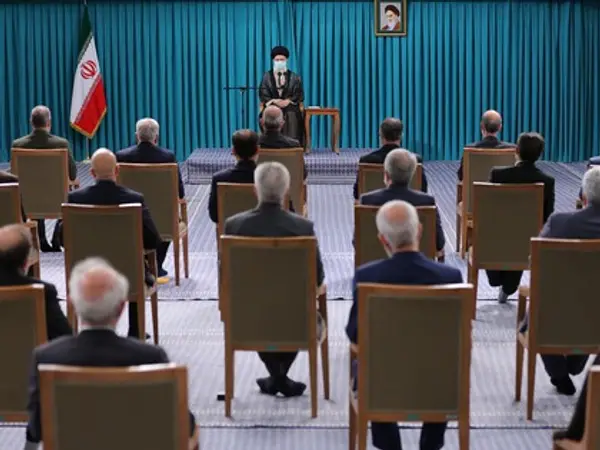The government has brought renewed hope to Iranians, Supreme Leader Ali Khamenei said Tuesday to defend President Ebrahim Raisi against mounting criticism.
In a meeting that takes place with the president and his ministers every year at the end of August, Khamenei found few concrete accomplishments to praise – something he usually does on this occasion.
Many politicians, social media activists and even allied hardliners have been criticizing Raisi for his economic performance, as inflation has risen, and he has been unable to deliver on his election promises.
Reports in the Iranian media about Khamenei’s remarks did not mention any comment on the ongoing nuclear negotiations that can lift sanctions and ease the mounting economic problems.
Khamenei told members of the government that “In my opinion your most important success has been to reawaken hope among the people.”
This is exactly what has been the subject of countless articles and interviews, even in Iran’s censored media, which began just weeks after Raisi took office a year ago. Many politicians and pundits have warned in the past months that people are losing hope and there is a high danger of a social explosion.
Since the United States withdrew from the JCPOA nuclear agreement and imposed sanction in 2018, Iran’s economic indicators of falling real wages, high inflation and increasing poverty have gotten worse by every passing quarter.
Raisi inherited the last one year of this difficult equation, but his domestic critics also insist that he did not have the experience to be chief executive. Similarly, they criticize his top aides and ministers for being second and third-rate functionaries, incapable of operating in the difficult financial environment.
Khamenei advised the government to pay close attention to inflation, economic growth, investments, employment, per capita income and the financial gap among social classes. While he prioritized these issues, he did not say how the government can deal with them amid sanction on oil exports and Iran’s international banking ties.
Khamenei also went on to praise Raisi’s frequent visits to provinces, also criticized by politicians as an ineffective exercise when the president has few tools to improve conditions around the country.
Riaisi in these visits often hears complaints and is faced with requests that he usually promises to address, while critics say most of these pledges remain on paper.
Khamenei also praised Raisi’s for not complaining or indirectly criticizing him. The previous president Hassan Rouhani and his supporters occasionally hinted that they did not have enough freedom of action, meaning that key decisions had to be approved by Khamenei.
Apart from numerous personnel and economically significant issues, the Rouhani government was not allowed to hold talks with the United States to find a solution for the nuclear issue and remove the crippling American sanctions.
